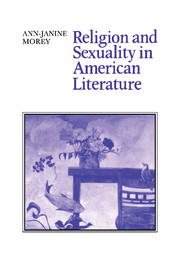Book contents
- Frontmatter
- Contents
- Acknowledgments
- Introduction
- 1 Body Language: Religion, Sexuality, and the Bioluminescence of Metaphor
- 2 The Stubborn Density of Desire: Religion and Sexuality in Nineteenth-Century Fiction
- 3 A Tradition of Divine Lechery: Men Write about the Ministry
- 4 A War of Words: Women Write about the Ministry. The Homiletic writers
- 5 Comfort to the Enemy: Women Write about the Ministry. The Parsonage Romance
- 6 The Fox in the Well: Metaphors of Embodiment in the Androcentric Imagination
- 7 Fatal Abstractions: Metaphors of Embodiment in the Gynocentric Imagination
- 8 Conclusion: Words Are Not the Thing Itself
- Appendix A The Homiletic Novels and Their Authors
- Appendix B The Parsonage Romances and Their Authors
- Bibliography
- Index
- Cambridge Studies in American Literature and Culture
5 - Comfort to the Enemy: Women Write about the Ministry. The Parsonage Romance
Published online by Cambridge University Press: 25 March 2010
- Frontmatter
- Contents
- Acknowledgments
- Introduction
- 1 Body Language: Religion, Sexuality, and the Bioluminescence of Metaphor
- 2 The Stubborn Density of Desire: Religion and Sexuality in Nineteenth-Century Fiction
- 3 A Tradition of Divine Lechery: Men Write about the Ministry
- 4 A War of Words: Women Write about the Ministry. The Homiletic writers
- 5 Comfort to the Enemy: Women Write about the Ministry. The Parsonage Romance
- 6 The Fox in the Well: Metaphors of Embodiment in the Androcentric Imagination
- 7 Fatal Abstractions: Metaphors of Embodiment in the Gynocentric Imagination
- 8 Conclusion: Words Are Not the Thing Itself
- Appendix A The Homiletic Novels and Their Authors
- Appendix B The Parsonage Romances and Their Authors
- Bibliography
- Index
- Cambridge Studies in American Literature and Culture
Summary
On December 21, 1832, the frozen body of Sarah Maria Cornell was found hanging at Durfee's farm, near Fall River, Rhode Island. Her cloak was “hooked down before and her hands under it, her knees within four inches of the ground, and her clothes smoothed under them.” There was a cord imbedded in her neck and her tongue protruded from her swollen lips. Those who prepared her body for burial found “marks of violence” about her person – bruises on her hips, back, knees and face, and a broken arm. Still, the death was ruled a suicide, and she was buried. But after letters to her that incriminated a local minister were discovered with her belongings, her body was disinterred and reexamined. Physicians concluded that she had been strangled prior to being hung, and that she had been pregnant. Shortly thereafter, Rev. Ephraim K. Avery was charged with her murder.
These and subsequent events are recorded in Fall River: An Authentic Narrative (1834). The author, Catherine Read Arnold Williams (1787–1872) is one of the very few writing women to address the problem of clergy seductions, and her candid entry is all the more remarkable for its early nineteenth-century date. Williams was a poet and historian, and in Fall River she applied herself to recording a particularly sordid portion of New England history, the alleged murder of Sarah Maria Cornell (1802–32) by the Reverend Ephraim K. Avery (d. 1869). She writes for the explicit purpose of warning young women “against that idolatrous regard for ministers…, which at the present day is a scandal to the cause of Christianity” (vi).
- Type
- Chapter
- Information
- Religion and Sexuality in American Literature , pp. 141 - 166Publisher: Cambridge University PressPrint publication year: 1992

